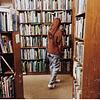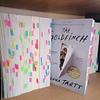Take a photo of a barcode or cover
Station Eleven follows various people throughout the unraveling and aftermath of a worldwide pandemic. We also get flashbacks to their earlier lives.
Written before the Covid-19 pandemic, some of the things that happen are all too realistic: stocking up on supplies like water, air traffic halting, people not being warned in time but mostly, people knowing about it but thinking it's probably not so bad and continuing their normal lives.
The big difference, though, is that this pandemic's death rate is estimated to be around 99%. Air traffic never starts back up again and eventually, all power networks, electricity and the internet cease to be. A new kind of survival society unfolds.
We follow different storylines in the past and present and learn why they are intertwined along the way.
This novel is a tale of a pandemic gone wrong, a view into a post apocalyptic society, but also a reflection about which things really matter and why.
You will not be disappointed. And I'm not going on a plane anytime soon.
Graphic: Death
Moderate: Animal death, Blood, Grief, Religious bigotry, Murder
Minor: Mental illness
Graphic: Adult/minor relationship, Death, Suicide, Violence, Murder
Moderate: Gun violence, Pedophilia, Kidnapping, Religious bigotry, Medical trauma
Graphic: Death, Terminal illness
Moderate: Gun violence, Violence
but this was a good read. I really enjoyed the writing and the different character stories and how they intersected with each other
Minor: Adult/minor relationship, Animal death, Death, Gun violence, Rape, Violence, Blood, Kidnapping, Murder
Reading this book right before and right after (at least the worst of) a pandemic is truly an odd experience. I remember on my first read thinking how dystopian and unrealistic a pandemic that decimates the world and changes life as we know it felt. Obviously we haven't experienced quite as fast-spreading and deadly of a pandemic as St. John Mendel created, but it was still quite jarring to read the second time around, since it hit a lot closer to home than it ever could in 2019.
One of the lines from the very beginning really struck me this time, because I think we all had that moment, not just in general but for this very type of scenario - "Jeevan was crushed by a sudden certainty that this was it, that this illness Hua was describing was going to be the divide between a before and an after, a line drawn through his life." It's impossible to read this book now without thinking of what we've lived through, but I'll try to disconnect for a moment to discuss my thoughts on the book itself.
I find it really difficult to put into words the way St. John Mendel's writing makes me feel. She just writes so beautifully, and so adeptly. Her prose is so unique and it really, truly leaves a mark in the most beautiful, aching way. And her ability to craft a story is amazing, the way her wide cast of characters' lives intertwine and connect and affect each other's. I don't want to give anything away, but it's clear she put so much work into the vision of her entire story, and everything has its purpose. Even with such a wide array of characters - I'd argue that there's about 5 main characters (we read from Kirsten, Jeevan, Miranda, Arthur, and Clark's perspectives - forgive me if I missed someone) and each of them are really well-developed and different and interesting, not to mention the variety of other secondary characters. I think she's one of those writers that just like, deeply understands the human condition and how to articulate it in a really beautiful, relatable way, and that is a true talent. I genuinely can't speak highly enough of Emily St. John Mendel.
The structure of this story is also really well-done. The nonlinear timeline is so effective, and it really helps to put into perspective what people lost, and how they've dealt with it. The switching POVs also keeps you so hooked in an almost frustrating way, because you'll leave one character dangling in a precarious situation and then jump back 20 years, but I didn't even mind it because I don't think there was one POV that I didn't like reading - I would say I prefer Kirsten, but I really did find each of our narrators interesting. I also liked her use of Shakespeare throughout, and the connection the Symphony draws between Shakespeare's life, living through a plague and creating beautiful art, and their lives - it's a really well-used literary tool.
I just... I can't speak highly enough of this book and this author. It's definitely a harder read nowadays than pre-COVID, that line drawn through our lives, but truly so worthwhile. I'll read anything Emily writes!
Graphic: Death, Violence, Grief
Moderate: Gun violence, Murder
Minor: Adult/minor relationship, Rape, Suicide
Graphic: Child death, Death, Gun violence, Suicide, Violence, Blood, Grief, Death of parent, Murder
Moderate: Death
Minor: Addiction, Gun violence, Sexual assault, Suicide, Violence, Blood, Kidnapping, Grief, Religious bigotry, Death of parent, Murder, Abandonment, Alcohol
Moderate: Death
Moderate: Death, Violence, Blood
Moderate: Death, Violence, Stalking, Murder




